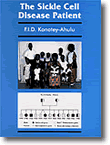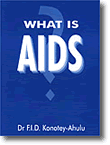Then and Now, The Early Years - A Personal Survey
BACKGROUND: On November 23 1986, The Sunday Express in London gave us the following piece of information: -
"Africa faces devastation from AIDS
The DEADLY disease AIDS is now so out of control in black Africa that whole nations of people are doomed, leaving vast areas of now-populated land devoid of a single person within the next 10 years. This nightmare of entire African populations disappearing has emerged after latest scientific estimates put the number of AIDS carriers at a staggering 5,000,000".
The Medical Correspondent of The Guardian newspaper in London, Andrew Veitch, on the day the British House of Commons first debated AIDS (November 21 1986) began his article on page 21 on "How to avoid catching AIDS", thus:
"The worst possibility is a holocaust: a third of the British population dead by the turn of the century. America and western Europe in a state of political and economic collapse, Africa left to the lions. The doomsday merchants do have a case: an estimated 10 million in the United States and probably 6 per cent of the entire population of Africa. The number of the full-blown disease is doubling every 10 months in Britain. The statistics roll on."
I thought to myself: "This is a new epidemic, I must find out what is happening on my continent". If the British undergraduate and postgraduate medical upbringing which I had had the privilege of receiving, did not equip me to discern what was happening, then nothing else would. My training did not let me down. I used what is called clinical epidemiology to acquire a bird's eye view of the problem. I had no money, so I did write to the WHO Global AIDS Office for funds. I was not rewarded with a reply. I approached African businessmen to sponsor me. Promises galore, but nothing came. So I went to National Westminster Bank in South Kensington, London SW7, to borrow money. The Bank Manager was puzzled at my request, but he lent me the money all the same. My wife was speechless, but she let me go.
The International Medical Press was very kind to me after my tour. They published most of the articles I sent to them. I reproduce details here for anyone researching the history of AIDS in Africa, wishing to build on work done at the grass roots, and keen to detect why and how AIDS, in a mere 10 years has gone in some African countries from Grade I (not much of a problem) to Grade IV (a very great problem). Grade V of my own classification, as indicated in some of my articles mentioned below, would represent "a catastrophe", with the streets of villages and towns strewn with AIDS corpses.
This time, I trust that African Businessmen and women will rise to the occasion, and sponsor some young people to go round African countries determining, for instance, whether sex alone was responsible for some populations moving ominously through the grades towards Grade V. The References mentioned below are as listed in my CV. Those articles not easily accessible in libraries would, hopefully, be reproduced in full.



